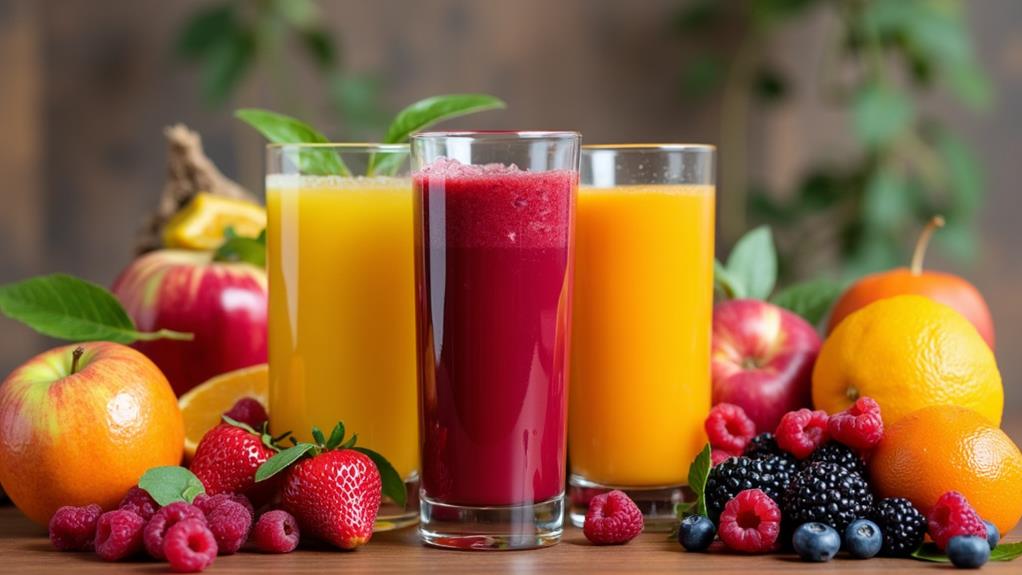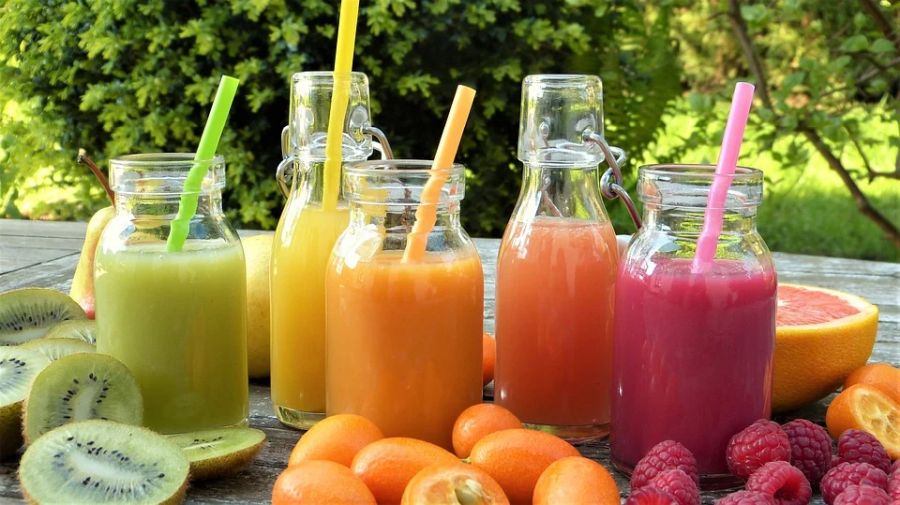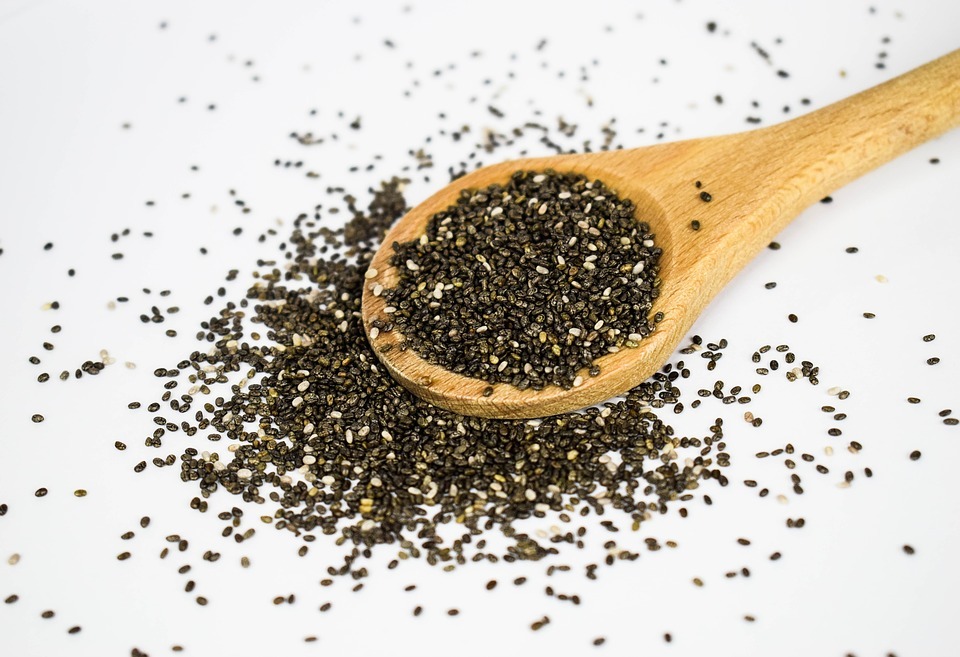Whole Fruit Vs. Juice: Which Is Better for Vitamins?

When deciding between whole fruit and juice, it's essential to consider the vitamin content. Whole fruits retain their skin and pulp, offering a higher concentration of vitamins, minerals, and beneficial dietary fiber. This fiber aids digestion and helps regulate blood sugar levels, making whole fruits a more balanced option. In contrast, fruit juices often lack this fiber, leading to potential spikes in blood sugar. So, is the convenience of juice worth the trade-off in nutrition? Let's explore further to determine which option truly benefits your health.
Nutritional Comparison
When comparing whole fruits to juice, the nutritional differences are significant. Consuming whole fruit provides a comprehensive package of essential vitamins, minerals, and fiber that juice lacks. For instance, a medium orange offers about 3 grams of fiber and a balanced nutritional profile, including higher levels of vitamins and phytonutrients found in the skin and pulp, which are often removed during juice processing.
In contrast, juice can cause a rapid spike in blood sugar levels. An 8-ounce glass of orange juice contains approximately 23 grams of sugar and lacks fiber, leading to quick sugar absorption and potential blood sugar fluctuations. This can negatively impact stable energy levels and overall health.
Whole fruits also enhance satiety, helping you feel fuller for longer. Research indicates that eating whole fruit can reduce overall calorie intake compared to drinking juice. The American Heart Association recommends limiting juice to one serving per day to manage sugar consumption effectively. Opting for whole fruits over juice provides superior nutritional benefits and better blood sugar management.
Fiber Content
Whole fruits are rich in dietary fiber, a crucial component often lost during the juicing process. For instance, eating an apple provides approximately 4 grams of fiber, whereas a cup of apple juice contains virtually none. This fiber deficit in juice means you miss out on benefits like improved digestion and increased satiety, both essential for a balanced diet.
Dietary guidelines recommend that women consume 21-25 grams of fiber daily, while men should aim for 30-38 grams. Whole fruits are an excellent way to meet these fiber requirements. Fiber plays a vital role in regulating blood glucose levels, thereby reducing the risk of heart disease and diabetes. In contrast, the lack of fiber in fruit juice can lead to spikes in blood glucose, resulting in energy crashes and increased hunger.
Additionally, the fiber in whole fruits promotes a feeling of fullness, naturally leading to reduced calorie intake. Conversely, fruit juice, being a concentrated source of sugar and calories, often results in higher consumption without the same satiety. For optimum health, incorporating whole fruits into your diet is a more beneficial choice than relying on fruit juice.
Sugar Levels

Sugar Levels
Understanding the fiber content of whole fruits compared to juice highlights another significant consideration: sugar levels. When you consume whole fruits, the natural sugars come with fiber, which helps regulate blood sugar levels. In contrast, fruit juice often contains concentrated sugars, leading to rapid spikes in blood glucose and insulin levels.
For example, a typical 8-ounce glass of orange juice contains about 23 grams of sugar, equivalent to the sugar found in several whole oranges. The American Heart Association recommends a daily sugar limit of 36 grams for men and 25 grams for women. Just a few servings of fruit juice can easily exceed these limits, which can be detrimental to your health.
Key points to keep in mind:
- Whole fruits provide not only sugar but also essential nutrients and fiber, contributing to feelings of fullness and better overall health.
- Fruit juice lacks the fiber of whole fruits, making it easier for sugar levels to spike quickly.
- Research indicates that whole fruits are linked to a lower risk of type 2 diabetes, whereas high fruit juice consumption may be a risk factor.
Choosing whole fruits over fruit juice ensures you get the necessary vitamins without negatively impacting your sugar levels.
Health Benefits
Embracing the health benefits of whole fruits can greatly enhance your well-being. Whole fruits are rich in fiber, which aids digestion, helps regulate blood sugar levels, and keeps you feeling full longer. This fiber content is absent in fruit juice due to the juicing process, making whole fruits a superior choice for maintaining stable blood sugar levels.
Consuming whole fruits has been linked to a lower risk of chronic diseases such as heart disease and diabetes. Unlike fruit juice, which can cause rapid spikes in blood glucose levels, whole fruits release sugar more slowly into your bloodstream, providing a steadier source of energy. They also offer a wider array of vitamins and minerals, as the skin and pulp—rich in nutrients—are retained, unlike in juice processing.
Moreover, whole fruits help you avoid excessive sugar intake. Fruit juice, even when it's 100% juice, can be high in natural sugars concentrated from several fruits, contributing significantly to your daily sugar intake if consumed excessively. By choosing whole fruits over juice, you promote better comprehensive health outcomes, as they improve satiety and reduce the likelihood of overeating.
Potential Risks

Despite the numerous health benefits of whole fruits, it's vital to recognize the potential risks associated with fruit juice. Drinking fruit juice can cause rapid increases in blood glucose levels due to its concentrated natural sugars, which can increase the risk of developing diabetes over time. This is a significant concern when comparing fruit juice to whole fruits, as the latter helps regulate blood sugar levels due to the presence of fiber.
Consider these points:
- Added Sugars: Many fruit juices, especially those that aren't 100% juice, contain added sugars or sweeteners, contributing to excessive sugar intake and associated health issues.
- Diabetes Risk: While whole fruits offer protective benefits against diabetes, fruit juice consumption can actually be a risk factor for developing the disease.
- Nutritional Imbalance: Excessive juice consumption can lead to nutritional imbalances, as juice lacks the fiber found in whole fruits, which is vital for digestive health and satiety.
Moreover, even though fruit juice is rich in vitamin C, it doesn't offer the same health advantages as eating whole fruits. The American Heart Association recommends limiting juice intake to one serving per day to mitigate health risks, especially those related to high sugar content.
Recommendations
To make the healthiest choice between whole fruits and fruit juice, the consensus is clear: opt for whole fruits. Whole fruits retain fiber, which aids digestion and provides a sense of fullness that juice cannot offer.
Consider these recommendations:
| Option | Benefits |
|---|---|
| Whole Fruits | Full of fiber, diverse vitamins |
| Juice | Convenient, but high in sugar |
| Whole Fruits | Aids digestion, promotes fullness |
| Juice | Can fit in moderation (75-224 mL) |
The American Heart Association suggests limiting added sugars, and even natural sugars in juice can add up quickly. Consuming whole fruits ensures you get a broader range of vitamins and minerals without the risk of excess sugar. For children under 5, prioritize milk and water, and serve juice only occasionally to minimize sugar exposure.




